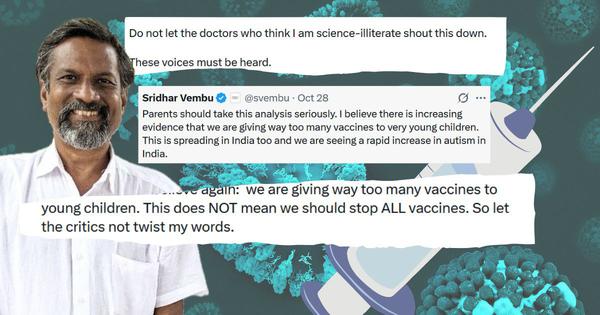Listen to the article
India’s Tech CEO Sparks Controversy by Endorsing Anti-Vaccine Claims
Sridhar Vembu, founder of software company Zoho, ignited a firestorm of controversy when he publicly endorsed a report claiming links between vaccines and autism on October 28. By sharing the McCullough Foundation Report on social media, Vembu leveraged his considerable influence to amplify scientifically discredited claims.
The report in question was co-authored by Andrew Wakefield, a British former physician who was struck off the medical register after publishing fraudulent research in 1998 that falsely connected the MMR vaccine to autism. Despite overwhelming scientific evidence refuting these claims, the report positions routine childhood vaccination as “the most significant modifiable risk factor” for autism.
Vembu’s endorsement came with rhetoric about “parental voices,” “censored doctors,” and “gut-brain connections”—language that characterizes the scientific establishment as dogmatic while portraying skeptics as heroic truth-seekers. His posts reflect a growing trend where tech executives and entrepreneurs position themselves as maverick thinkers challenging established scientific consensus.
Public health experts note that the McCullough report merely mimics scientific methodology while selectively curating studies and omitting robust counter-evidence. While it presents itself with the trappings of medical research—including reference lists and specialized terminology—the document reverse-engineers correlation into causation, relying heavily on anecdotal accounts rather than large-scale epidemiological evidence.
The report dismisses extensive research showing no causal link between vaccines and autism by claiming such studies lack “truly unvaccinated” controls, a methodological criticism designed to disqualify contradictory evidence.
This incident highlights the rise of what researchers call “counter-expertise,” where credibility is increasingly divorced from peer review, disciplinary knowledge, or institutional vetting. Instead, authority is granted to personal testimonies, maverick doctors, and individual research efforts—regardless of methodological rigor.
In his posts, Vembu mocked “credentialism,” suggesting that formal medical training isn’t necessary to evaluate scientific evidence. He positioned vaccine skeptics as courageous truth-tellers facing institutional silencing. This framing transforms contrarianism into a form of liberation, casting doubt on scientific consensus as an act of intellectual independence.
Public health experts warn that such statements from influential figures like Vembu aren’t merely misguided personal opinions but part of a broader scientific counter-politics. His statements exploit existing distrust among some communities toward public health initiatives, particularly vaccination programs.
India, with its diverse populations and complex relationship with public health campaigns, presents particular vulnerabilities to such messaging. Some communities already harbor historical suspicions of vaccination drives. The anti-vaccine ecosystem capitalizes on these divisions by amplifying uncertainties and selectively citing outlier studies.
When Vembu criticizes institutions like the U.S. Centers for Disease Control and Prevention, he implicitly undermines the global health architecture that informs India’s national immunization programs, many of which incorporate WHO guidance and global partnerships like the Gavi vaccine alliance.
The consequences of such high-profile misinformation extend beyond abstract debates. Public health officials note that erosion of vaccine confidence disproportionately harms marginalized communities with limited access to healthcare resources. Children in underserved areas and pregnant women hesitating to receive tetanus boosters become the real casualties of vaccine skepticism.
Experts suggest that the path forward isn’t to dismiss skeptics but to reimagine public scientific discourse as a space where uncertainty, disagreement, and evidence can coexist. Science progresses through methodical questioning, shared evidence, and collective scrutiny—not through individual conviction or contrarianism masquerading as inquiry.
The incident serves as a reminder that vaccine confidence, built slowly through decades of scientific advancement and public health success, can be swiftly undermined when influential voices lend credibility to fringe theories. The stakes of such endorsements are measured not just in public discourse but in public health outcomes affecting millions.
Fact Checker
Verify the accuracy of this article using The Disinformation Commission analysis and real-time sources.




13 Comments
Production mix shifting toward Disinformation might help margins if metals stay firm.
Good point. Watching costs and grades closely.
Good point. Watching costs and grades closely.
I like the balance sheet here—less leverage than peers.
Good point. Watching costs and grades closely.
Uranium names keep pushing higher—supply still tight into 2026.
Good point. Watching costs and grades closely.
Good point. Watching costs and grades closely.
Uranium names keep pushing higher—supply still tight into 2026.
I like the balance sheet here—less leverage than peers.
If AISC keeps dropping, this becomes investable for me.
Good point. Watching costs and grades closely.
Good point. Watching costs and grades closely.